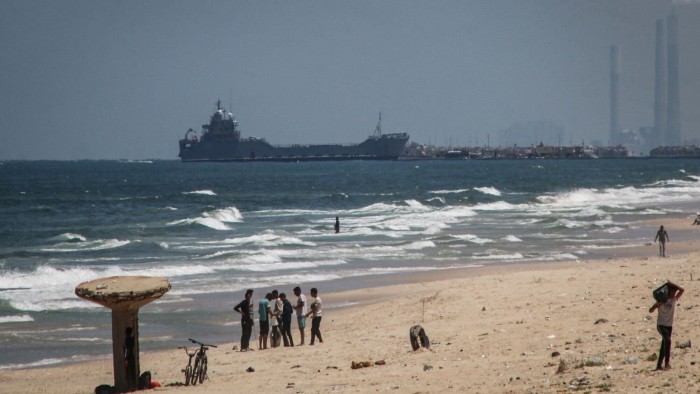Share this @internewscast.com
Boston Consulting Group received over $1 million for its collaboration with a private US firm aiming to transport food to Gaza via sea, during which it also initiated a debated partnership with the Gaza Humanitarian Foundation, according to the Financial Times.
The consultancy’s team collaborated with Fogbow, an aid organization operated by US military veterans, on a Qatar-funded mission to deliver relief supplies to Gaza using barges departing from Cyprus, as reported by sources knowledgeable about the project.
The specifics of this venture reveal BCG’s readiness to work with private sector initiatives to deliver assistance to Gaza, circumventing the standard UN-led operations. This strategy is criticized by aid organizations for potentially compromising humanitarian values by incorporating business motives.
After an initial period providing pro bono advice, BCG went on to bill the Geneva-based Maritime Humanitarian Aid Foundation more than $1mn for the work assisting Fogbow between March 2024 and February this year, the people said.
MHAF was designed by Fogbow’s founders to act as a conduit for international funding for its plans, including tens of millions of dollars committed by the government of Qatar. BCG charged the foundation a discounted rate, the people said.
Unlike the GHF work that was led by partners from the firm’s US defence practice, the Fogbow project was led by BCG partners from Europe, including from the firm’s humanitarian response practice.
It included helping set up an MHAF entity in Switzerland, compiling monthly reports that were shared with the government of Qatar, and other administrative tasks for the foundation, according to people familiar with the project.
“In spring 2024, BCG was engaged by the Maritime Humanitarian Aid Foundation to support the foundation’s early development,” the consulting firm said in a statement.
“This engagement followed BCG’s client acceptance procedures. The project was subject to our robust internal oversight process, including internal review panels and real-time evaluation.”
The consulting firm is facing a reputational crisis as a result of revelations about its other Gaza-related work, helping to set up and provide operational advice to the GHF, which ran from October 2024 until BCG bosses shut down the project in May.
The FT revealed earlier this month that the project extended to modelling a postwar Gaza and the costs of relocating hundreds of thousands of Palestinians from the shattered enclave.
BCG fired the two US partners that led the GHF work, saying they ignored approval processes and disobeyed an order not to do the postwar modelling work. This week the firm stripped two senior executives, including its chief risk officer, of their leadership roles.
Fogbow’s plan was conceived earlier in the war in Gaza and was an attempt to create a maritime corridor from Cyprus to Gaza, a concept backed by the EU and others as a means to overcome barriers Israel had placed on the entry of aid.
Israel had throttled the entry of aid from a UN-led system on traditional land routes, claiming that it was being stolen by Hamas. At the same time far-right ministers advocated the use of aid as leverage in the conflict.
Fogbow’s team, which included former US diplomats and military officials, had leveraged their connections in the US and Israeli governments, and several Gulf countries, to receive at least some approvals from the Israeli government to set up the maritime corridor, two people familiar with the matter said.
The aid would have been scanned for weapons in Cyprus and transported on barges to a point on the Gaza shoreline, which would have been dredged to allow the barges to unload the supplies.
The plans were ultimately overtaken by an announcement by President Joe Biden that the US military was going to build a floating pier on the Gaza shoreline to transport aid from Cyprus starting in May 2024.
“We fed people, and we’re still trying to feed people. It’s hard, hard work, you know?,” said Cameron Hume, the executive director of MHAF, and former US Ambassador to Algeria, South Africa and Indonesia. “We do this by partnering with trusted humanitarian organisations and by working with logistics experts like Fogbow and others.”
Fogbow ultimately sent about 200 tons of aid into Gaza via the pier, and about 900 tons through the Israeli port of Ashdod and on the same land routes it had sought to avoid.
The US pier broke apart several times in the Mediterranean waves, and was mothballed after less than a month of operations.
BCG staff supported MHAF “administratively and strategically”, according to a person familiar with the work. It helped set criteria that MHAF should use to evaluate contractors, including whether Fogbow should be replaced, and advised on the hiring of foundation employees.

As the maritime aid project was overtaken by the US pier, BCG staff also participated in workshops to discuss how the foundation might expand its work beyond Gaza, the person said.
Two people familiar with Fogbow’s plans said that at no point did Fogbow or BCG consider the use of private military contractors or the relocation of Palestinians.
Fogbow and MHAF say that their shipments provided more than 10mn meals in Gaza at a time when Palestinians were facing crisis levels of hunger, and that it has also subsequently provided vital relief in Sudan and South Sudan.
The US and Israel have backed the GHF as the most effective way to bring aid into Gaza, but it failed to secure wider multilateral support and has been condemned by the UN as a “fig leaf” for Israeli war aims. Its launch has been marred by the deaths of hundreds of Gazans, who have come under fire from Israeli soldiers on the journey to aid distribution sites operated by its private security contractors.
BCG pulled out of a $4mn contract for GHF at the end of May, saying it will not now take payment.
GHF said it had delivered nearly 70mn meals directly to the people of Gaza and accused the consulting firm of “corporate cowardice” for distancing itself.
“Under pressure from the UN and affiliated institutions . . . BCG abandoned a mission they once supported because it started to impact their bottom line,” it said In a social media post on Friday.
BCG declined to respond.




